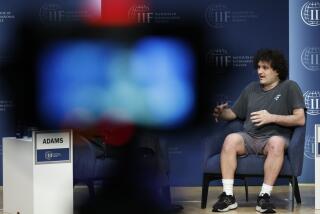Stanley Chais dies at 84; money manager invested with Bernard Madoff
- Share via
Stanley Chais, the Beverly Hills money manager whose clients lost hundreds of millions of dollars in the notorious Wall Street investment scam run by Bernard L. Madoff, died Sunday in New York. He was 84.
Chais, who was facing a lawsuit by the Securities and Exchange Commission and was under criminal investigation by federal prosecutors in New York, died at an undisclosed location in Manhattan, said Ellen Borakove, spokeswoman for the New York City chief medical examiner. No cause was given, but Chais had been suffering from a rare blood disease.
Before the Madoff scandal broke in 2008, Chais was a respected financier and philanthropist who had donated millions to dozens of Jewish charities in the U.S. and Israel. He was particularly generous to educational institutions, providing funding for programs to aid children with learning disabilities, among many other causes.
But the charitable organization Chais ran with his wife, playwright and screenwriter Pamela Chais, collapsed along with Madoff’s scheme.
Madoff pleaded guilty in 2009 to 11 federal crimes and admitted that he had turned his wealth management business into the largest Ponzi scheme in U.S. history, bilking thousands of investors of billions of dollars.
Born in the Bronx in 1926, Chais served on the boards of a number of Israeli schools and universities, including the Weizmann Institute of Science, the Hebrew University of Jerusalem and the Technion-Israel Institute of Technology, often likened to MIT. He held honorary degrees from many of those institutions.
He also poured money into more than 50 Israeli businesses, according to online biographies posted by Jewish groups with which he has been affiliated.
In 2009, the SEC filed civil charges against Chais, alleging that he had steered hundreds of millions of dollars from investors to Madoff, generating some $270 million in fees, and that he knew Madoff was operating a Ponzi scheme. When the scheme collapsed in 2008, Chais’ books showed that his clients had balances of more than $900 million -- including Madoff’s fictitious returns, according to the SEC.
The U.S. attorney’s office in Manhattan persuaded a judge to issue a stay on the SEC lawsuit so it could pursue a criminal investigation. But no criminal charges were ever filed. In June, a judge suspended activity in the lawsuit until December of this year.
The SEC had accused Chais of telling clients that he was investing the money himself, but instead giving it all to Madoff. The two financiers had a relationship going back 30 years.
Soon after the scandal broke, Chais moved to Manhattan, citing a need for medical treatment. Before that, he and his wife had lived in Beverly Hills and West Hollywood.
In an interview this month, Pamela Chais said that her husband was extremely ill and that he was receiving regular dialysis treatment.
“My husband is in very bad health,” she said at the time, from the couple’s Manhattan apartment. “I spend most of my time between the apartment, taking care of it, and the hospital. It’s a nightmare for him and me. Thank God we love each other.”
In 2009, Dr. Stephen D. Nimer of New York’s Memorial Sloan-Kettering Cancer Center wrote a letter to a federal bankruptcy court involved in the Madoff affair, saying Chais had “profound anemia” that caused him “serious fatigue.” The letter said Chais was receiving ongoing blood transfusions.
Chais’ attorney, Eugene Licker, has maintained that Chais had no idea that Madoff was operating a Ponzi scheme.
“Mr. Chais and his family were major victims of the Madoff fraud,” Licker said in a statement in 2009. “The notion that he was complicit in it is outrageous.”
Licker did not respond to an e-mail requesting comment about his client’s death.
To date, six people -- Madoff and five employees -- have been prosecuted in connection with Madoff’s fraud.
None of the investment advisors who funneled money to Madoff face criminal charges; Chais was the only advisor whom prosecutors had identified as a subject of a criminal investigation.
Robert Chew, a Los Angeles marketing consultant, said he invested $700,000 with Chais, only to lose it all. He called Madoff’s scheme “financial mass murder.”
A list of Chais’ survivors in addition to his wife was not available.
More to Read
Inside the business of entertainment
The Wide Shot brings you news, analysis and insights on everything from streaming wars to production — and what it all means for the future.
You may occasionally receive promotional content from the Los Angeles Times.











